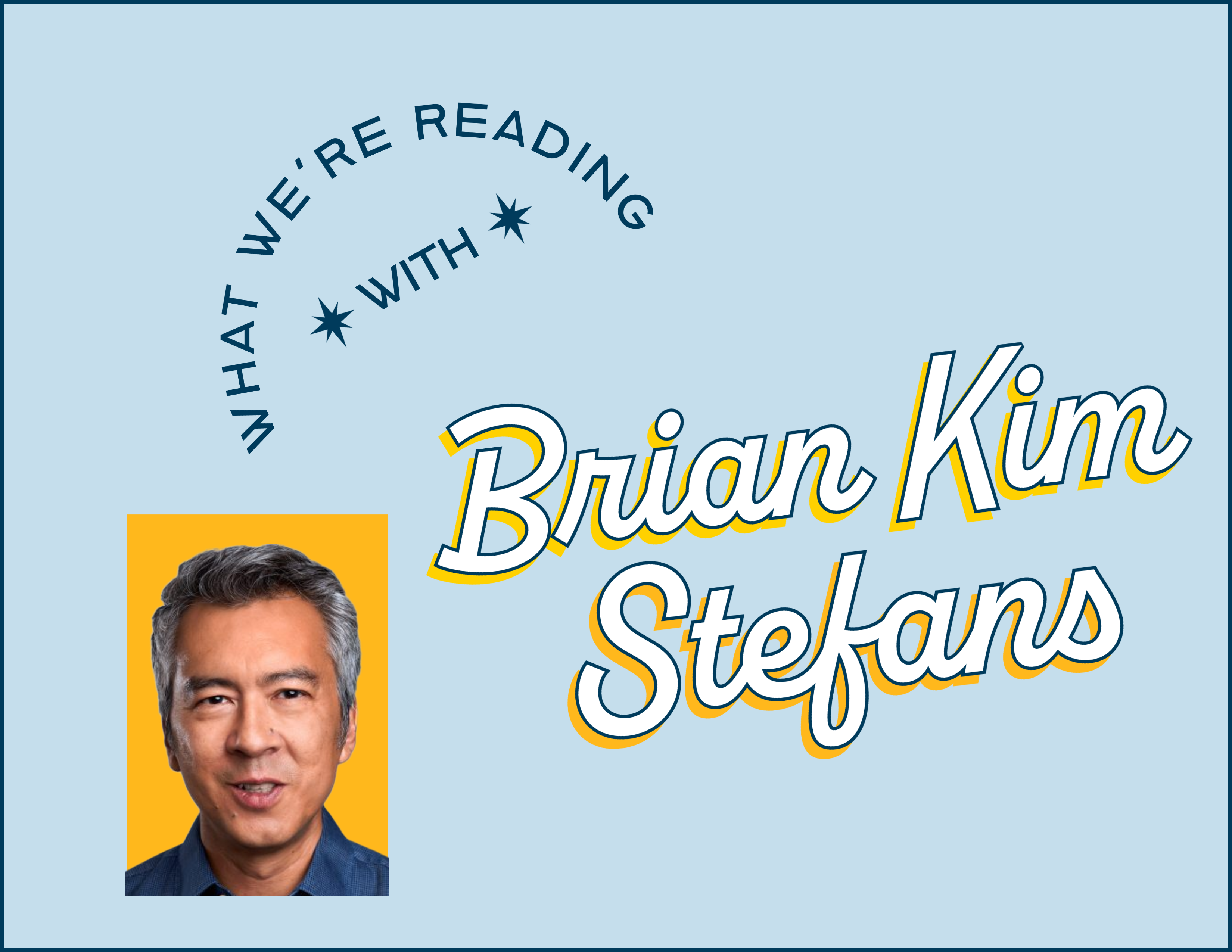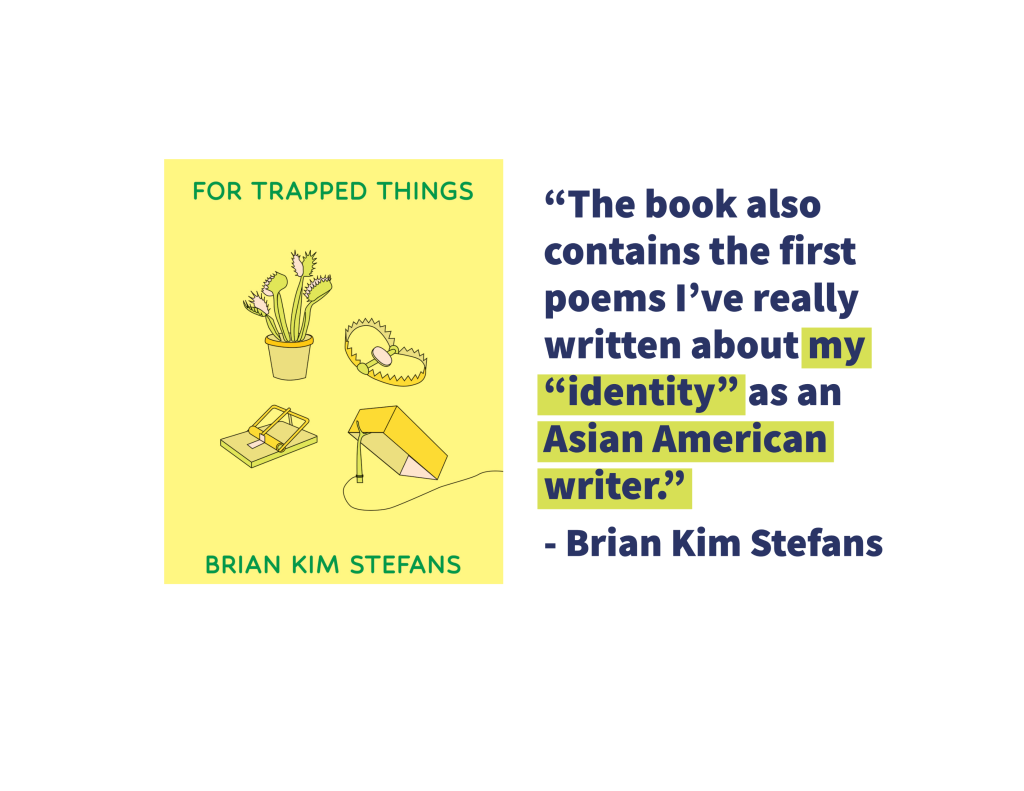What We’re Reading with Brian Kim Stefans

Professor Brian Kim Stefan’s new book, For Trapped Things (Roof Books, 2023), was published earlier this year. We caught up with Professor Stefans to discuss how his new work came about.
Can you tell us a little bit about your new poetry collection, what it’s about?
Like most of my books of poetry, For Trapped Things is a bit of a miscellany of poems about several different topics, written in many styles, that I’d written in the past years, in this case starting with the Presidential primaries in 2016 up to about the start of the pandemic.
They have to do with a lot of the most hot button topics you can think of: white supremacy in the public sphere, the infiltration of the new media on our private lives, ecological disaster, the failure of the American culture to care for its children, and what I think of, rather high-mindedly, as a lack of belief in the singular uniqueness of individual humans, the lack of appreciation we (in my somewhat pessimistic outlook) have in the details of our lives.
A few of them have to do (haha) with my troubled love life, amours wise and unwise. And with my life in L.A. in general.
This isn’t to say that the book is autobiographical in any way. I tried to write poems that reflected an “individual” who is separated from the various cultural paradigms that make us less singular, less the creators of our own worlds. My sense is that various cultural forces, if from academia, the media, churches, political propaganda, and so forth, narrow the very language we can use to express our strangeness.
I believe, in fact, that every individual is strange in a sense, which is what makes everyone I talk to interesting (haha, at least for a little while). Well, I’m sure that doesn’t help.
Where did the idea for this collection come from?
These poems were written roughly from the start of the American presidential election cycle as I mentioned, running through what I call, optimistically, the “Trump Era,” and on through the time of lockdowns we had in the early years of the Covid pandemic, though none of these poems were written during the pandemic, just revised then.
The title, which I thought of during the lockdown, is from a John Wieners poem that I’ve always loved, “A Poem for Trapped Things.” There is no dedication to the book, just to “trapped things.”
While many of the poems point back to my earlier interests in the avant-garde — these are the most free-wheeling ones, with words dashing across the page, or the most austere ones that run down the page like (ok, I just thought of this) droplets of rain — a great deal of them are written in quasi-formal verse, meaning a lot of rhyme and set stanza structures. Some are derived from my admiration of T.S. Eliot’s quatrain poems, but most are informed by the quatrain-style I developed for my translations in Festivals of Patience: The Verse Poems of Arthur Rimbaud, which I was writing at about the same time.
The poems are not all satirical, and certainly not all “political.” Yes, a lot of them were written with a sort of “stand-up poet” mindset—I wanted to write poems that could be read on the Bill Maher show and have an immediate impact (I’m serious about that).
Many poems were inspired by the poems of Rilke—I had a photocopy of the Die Sonnette an Orpheus (yes, in German, which I have a handle on) sitting on my desk, which I would dip into occasionally for inspiration. These have to do with bodily sensation, with pure human being in a sense. While so many poems in the collection want to de-center the subject (that sounds terribly academic), meaning to draw the reader away from the self into the chaos of things not ourselves (i.e. to make the reader, and no doubt myself, less narcissistic), the Rilke poems provide, I hope, a retreat from the noise of public and academic discourse, of electronic disturbance, and so forth.
The book also contains the first poems I’ve really written about my “identity” as an Asian American writer (one titled, quite creatively, “My Identity”), my first really meaningful poems about love—both on a personal level, but also as a philosophical possibility—and about other things such as the prospect of “joy” in the contemporary world (I was raised a Catholic), the meaning of friendship and communion, and aging and death. All the good stuff.
How long did it take to write these poems and to form this collection? How did you know when the collection was complete for a book?
I’ll be honest: I was floundering when I tried to assemble the mass of writing I had done during the period described above into a book. The good news is that I wrote a lot of poems in styles I never thought I would use (the rhymes, the quatrains), about things I thought I’d never write about. The bad news is that I had no idea whether most of them were any good. The poems were in a style most people didn’t know from me, so that was scary.
Luckily, I had a good editor in James Sherry at Roof Books in New York who read through the large manuscript I had sent him and had some very clear ideas of what should be in, what should be out, and he was very supportive. Yes, there were a few I was in love with that he was adamant on excluding, but I really needed a sure hand. He even came up with a good sequencing of the poems (I was just organizing them alphabetically by title). In the end, I was only sure it was “complete for a book” when James told me so.

What do you hope readers come away with after reading your poetry?
I really tried, in this one, to write poetry for people who don’t normally read poetry. I tried to write it for my mother, for instance, who is a great poet herself (I’m serious), a woman who was raised during the Korean War, which started when she was six, whose command of English is imperfect (she’s pretty much created her own English), and who—more from her adult life in New Jersey than anything having to do with Korea—has (rightly) thought of my poetry as way too much concerned with elitist aesthetic concerns, way to show-boaty than with what happens on the ground, meaning general life, pared down to its elements of mere (but also worthy of celebrating) living and surviving.
But for everybody else: what I hope is that readers see a real human being in the poetry despite my attempts at being a sophisticated artist. I doubt my collection will ever reach those people, or if it does, I don’t think they’d care much for it, but them’s the shakes.
What motivates you to write poetry?
I used to just do it because I was full of piss and vinegar, as they say—I just wrote all the time. For most of my life, I just waited for the great line, the great poem, and would punch myself if I wasn’t ready to receive it.
I remember reading that Ernest Hemingway would have to have his legs tied to a chair to get him to write. I couldn’t understand that, but I do now, a bit—as you get older, you don’t seem to be burbling desire to just explore what’s possible in language. I write because I think poetry—this, again, sounds high-minded—is the ultimate form of literary expression when done right. Novelists get all the glory; I think that poets today want that glory, but many have forgotten what it takes to write a poem that might not be appreciated today, but which will actually have “legs” (as they say in journalism), which is to say last. I like the underdog element—novelist get the big prizes, get movies made of their works, but we plug away at shit only because we think we’ll reach a sort of experience that is denied those who don’t try.
I’m actually a musician, and write poems, sometimes, in the way a musician might write a piece. I sit down, type some things, listen to what I typed—like working out things on a piano—and see if I can move on. If I can, it’s true glory—I am part of the music. Even if the poems sucks in the end, I’ve made the journey. That’s my pleasure, not the reader’s, unless I manage to revise the poem to convey that journey.
Do you have a favorite poem from your new collection you’d like to share with others?
Here’s a poem that hasn’t been published in a journal but is in the book which many people seem to really like. Yes, a bit of heartbreak in there.
Thesaurus
Und fast ein Madchen war
—Rilke
for Anna
Something was terrible in the thesaurus:
she, troubling. She came forth
and didn’t know the names of the furniture,
could only count to twelve on fingers,
could cry with animals but not mothers,
and only stood on stools, not floors,
and was beautiful, a ventriloquist of symbols,
and could not be photographed, much as I tried.
She sort of died when the wine died.
She was someone I recognized, not from a dream,
rather, someone I’d touched. I knew
the way she barked my name when she came home,
with love. Yes, she came forth,
proud as stained glass in a new church,
one I’d not enter, but try to photograph.
She made a bed in someone’s ear.
I couldn’t hear it. I only knew the words:
she knew Ursa Minor and the Big Dipper,
Orion and skunks. Enough, enough,
mysteries of Budapest, ruins of Pula.
She could only read pages half-burned,
recount half-German in good translations,
sweep across the floors not encountering dust,
and died when I closed the book.